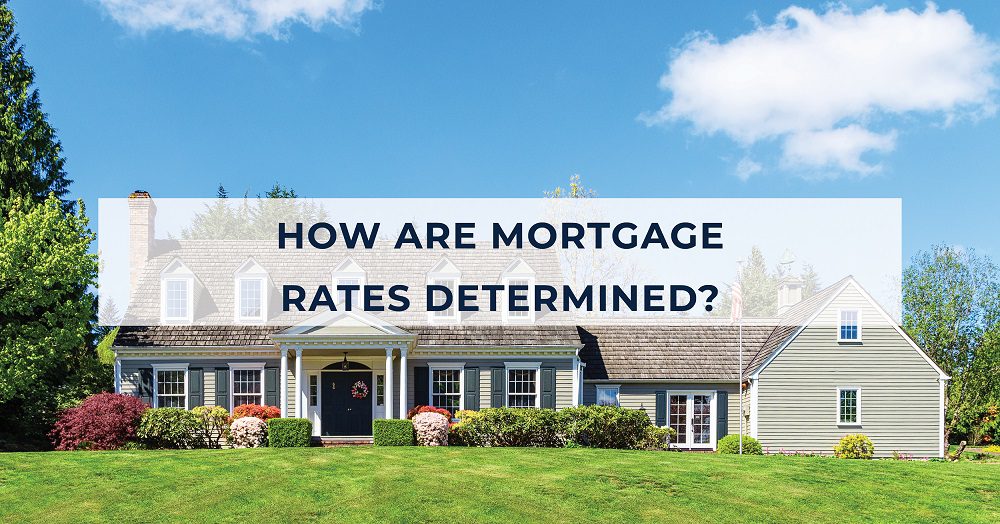
By Alena Kairys
Mar 18, 2023Every homebuyer wants a great mortgage rate, but what exactly goes into how the rates are set? No, it’s not astrological movements or cloud formations; it’s a variety of financial and economic elements. Learn how these factors impact how mortgage rates are determined.
Your Finances
Credit Score
You don’t need a “perfect” credit score to buy a home, but having a strong score gives you access to more competitive interest rates and programs. Your credit score is a significant metric in predicting how likely you’ll be able to pay back the mortgage. Even if you’re not thinking of buying a home in the near future, build up your credit score now so it’s primed for when you’re ready.
Debt-to-Income Ratio (DTI)
Having a high debt-to-income ratio (DTI) means you have little money left after paying your current bills, and it can lead to paying higher interest rates. Take steps to pay off debts, especially high interest ones like credit cards.
Loan-to-Value Ratio (LTV)
The loan-to-value ratio (LTV) also factors into your rate. If you’re seeking a mortgage that covers over 80% of the home’s price, it’s considered a high LTV and is considered riskier. You’re more likely to be offered a lower rate if your LTV is 80% or under, and you won’t need to pay private mortgage insurance (PMI).
Down Payment
Though having a 20% down payment is not necessary for all home buying programs, the amount you’re able to contribute to a down payment can affect your mortgage interest rate. Lenders view borrowers who can put down more money upfront to be less risky, and can offer lower rates. The down payment amount can also lower your LTV.
Mortgage Points
Though it is entirely optional, paying mortgage points at closing (aka, buying down the rate) is another way to lower your interest rate. One point equals 1% of your mortgage, and buying additional points will minimize your rate even further. The discounted rate stays with the loan until you refinance or pay it off.
Federal Reserve Actions
The Federal Reserve is always a hot topic whenever mortgage rates shift, but they don’t actually set mortgage rates. Instead, they determine the federal funds rate, which is how much interest banks are charged for borrowing from the Fed and when exchanging money with other depository institutions. The Fed considers various market indicators when they decide to change the federal funds rate. These factors include: economic growth, inflation, unemployment, the housing market, and the overall health of the economy.
The funds rate has a direct effect on rates for adjustable-rate mortgages (ARMs), home equity lines of credit (HELOCs), and home equity loans, all of which are based on an index. When it comes to fixed-rate mortgages, the funds rate has a more indirect impact as it can spur demand in the bond market. For example, a lower funds rate boosts bond prices and investor demand, leading to lower mortgage rates. Conversely, increasing the funds rate can lessen bond prices and demand, resulting in higher mortgage rates.
The Bond Market
Mortgages are largely based in the mortgage-backed securities market (investors buy groups of mortgages), which is influenced by U.S. Treasury securities (government bonds). Bond prices and rates have an inverse relationship, and shifts in the bond rate often cause similar movements for fixed-mortgage rates. Mortgage lenders use bond market activity as a guideline to set their lending rates.
Your Lender and Loan Programs
Another thing that makes mortgage rates hard to pin down is that lenders have different criteria for eligibility and don’t all offer the same programs and incentives. Rates and requirements are not uniform across all loan programs. Mortgages with shorter repayment terms tend to have lower rates than those with longer terms, but the monthly payment is usually higher. When deciding which lender and mortgage program to work with, be aware that the advertised rate may reflect a best-case-scenario and can differ from what you may be eligible for. Be sure to work with a loan originator to see what options are available for your unique situation.
There’s no such thing as a universal mortgage rate; rates differ depending on individual circumstances, economic conditions, lenders, and loan programs. Even though you can’t control every aspect that affects interest rates, it’s important to manage the ones you can. Working with a reliable lender and improving your finances will give you an edge when you’re ready to buy a home.
If you have any questions about using mortgage points, contact one of our licensed Mortgage Loan Originators. If you are ready to begin the home buying process, click here to get started!
These blogs are for informational purposes only. Make sure you understand the features associated with the loan program you choose, and that it meets your unique financial needs. Subject to Debt-to-Income and Underwriting requirements. This is not a credit decision or a commitment to lend. Eligibility is subject to completion of an application and verification of home ownership, occupancy, title, income, employment, credit, home value, collateral, and underwriting requirements. Not all programs are available in all areas. Offers may vary and are subject to change at any time without notice. Should you have any questions about the information provided, please contact us.